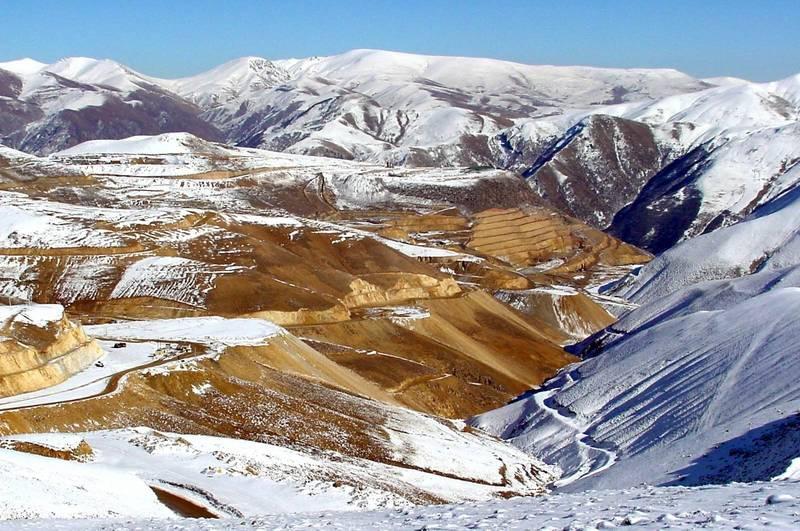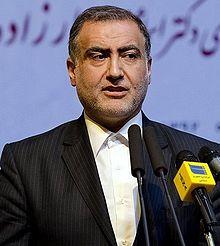Ethnic minorities in Iran struggle against exploitation amid resource wealth Ethnic minority marginalization
The exploitation of natural resources by the Iranian government, particularly in areas inhabited by ethnic minorities like the Turks/Azerbaijanis, has been a longstanding issue that continues to erode the economic and social fabric of these regions.
Despite legal obligations to share revenues with local provinces, the reality paints a starkly different picture - one of neglect, exploitation, and economic disenfranchisement.
One glaring example of this exploitation is the Sungun copper mine in Varzaqan county of East Azerbaijan Province, which generates an annual income of approximately $1.2 billion. Shockingly, this significant revenue stream is funneled away from the local community and into distant provinces, failing to benefit the very people who live and work on this land.

According to Behnam Rezvani, a representative in the Iranian parliament from Kaleybar, the Sungun mine's revenue is siphoned off to Kerman Province, depriving East Azerbaijan of vital funds desperately needed for infrastructure development, healthcare, education, and other essential services. The legal requirement stipulating that 10% of the mine's income should be allocated to East Azerbaijan Province is consistently overlooked, highlighting a pattern of deliberate negligence by the central government.
The consequences of this exploitation are dire. Local communities, such as those in Qaradagh region, suffer from inadequate roads, medical facilities, schools, and access to clean drinking water. Despite the immense wealth generated by the Sungun mine, these basic needs remain unmet, exacerbating poverty and perpetuating a cycle of underdevelopment.
Efforts to address this issue have been met with resistance and indifference from the Iranian government. Calls for reform by Azerbaijani parliamentarians, including Mohammad-Reza Pour-Mohammadi, former governor of East Azerbaijan, have fallen on deaf ears. Even prominent figures like Masoud Pezeshkian, representing Tabriz in the Iranian parliament, have advocated for projects aimed at benefiting local communities, such as the construction of a copper processing plant in Varzaqan, only to face obstruction and rejection by non-Azerbaijani managers and authorities.

The significance of the Sungun copper mine cannot be overstated - it is the largest copper mine in the Middle East, accounting for 60% of Iran's copper production. Yet, instead of fueling economic development in the region, the fruits of this labor are exported as raw materials to other provinces, further widening the economic disparity between resource-rich areas and the centers of power in Tehran and Kerman.
The recent crackdown on protesting copper mine workers underscores the government's determination to suppress dissent and perpetuate exploitative practices. The use of anti-riot police forces to quell legitimate demands for better working conditions and fair wages reflects a broader pattern of disregard for workers' rights and civil liberties.
In light of these injustices, there is a pressing need for systemic reform. The Iranian government must heed the calls for equitable distribution of wealth and resources to ethnic minority regions. The revenue generated from natural resources like the Sungun copper mine should be reinvested locally to uplift communities, improve living standards, and foster sustainable development.
Key stakeholders, including international organizations and civil society groups, must amplify their support for ethnic minority rights and economic justice in Iran. Pressure should be exerted on the Iranian government to uphold its legal obligations and end the systemic exploitation of natural resources that disproportionately harms ethnic minority populations.
Social media reax
The scale of the protests prompted responses from prominent exiled politicians like Maryam Rajavi of the Mojahedin-e Khalq Organization (MKO/MEK), a group considered a fierce adversary of Iran's theocratic regime.
On July 7, 2022, Maryam Rajavi tweeted in support of striking workers, specifically referencing the Sungun copper mine workers in Varzaqan, East Azerbaijan. She condemned the regime's crackdown on the workers, stating, "Workers of #Sungun copper mine in #Varzaqan...The workers’ rightful voice cannot be silenced."
Similarly, user BaharIran@7 urged support for the workers, calling on international labor unions and organizations to condemn the clerical regime's repression and demand the release of imprisoned workers.
In an intriguing development, an Iranian cyber-actor affiliated with the exiled opposition MKO/MEK named Qiam Ta Sarnegouni hacked Iran's parliament website on February 13, 2024. The parliament confirmed the breach and noted that the hacker group is associated with MKO/MEK.
The leaked document from the hack, detailing MPs' salaries for a specific month, triggered a public backlash in Iran over the perceived high salaries and bonuses of the MPs.
Qiam Ta Sarnegouni typically replaces the targeted websites' front pages with images of MKO leaders, notably Massoud and Maryam Rajavi, accompanied by pro-MKO messages and slogans like "Death to Khamenei, greetings to Rajavi".
Qiam Ta Sarnegouni has targeted various Iranian websites and media outlets since January 2022, including state-run TV channels, the Culture and Islamic Guidance Ministry's website, the Foreign Ministry's website, and the president's website.
Iran has labeled the Albania-based MKO group as a "terrorist" organization and accused it of significant acts of sabotage in the country. This designation has led to widespread arrests and executions of group members in Iran.
Conclusion
The plight of ethnic minorities in Iran, particularly those living in resource-rich regions like East Azerbaijan, underscores the urgent need for comprehensive reform. The Sungun copper mine symbolizes both the potential for economic prosperity and the stark reality of exploitation and neglect.
The situation facing ethnic Azerbaijanis in Iran, particularly those residing in resource-rich areas like East Azerbaijan, highlights the pressing need for comprehensive reform. The Sungun copper mine epitomizes the dual narrative of economic promise and stark exploitation and neglect.
Similarly, the challenges confronting Lake Urmia in Iran are alarming. Once among the world's largest saltwater lakes, it has dramatically contracted due to a combination of factors including climate change, river damming, and excessive water diversion for agriculture. This has resulted in ecological devastation, wildlife habitat loss, and profound economic repercussions for local communities. Urgent action is imperative to revive and safeguard this critical ecosystem. However, the Iranian theocratic government has yet to take meaningful steps to address this critical issue.








